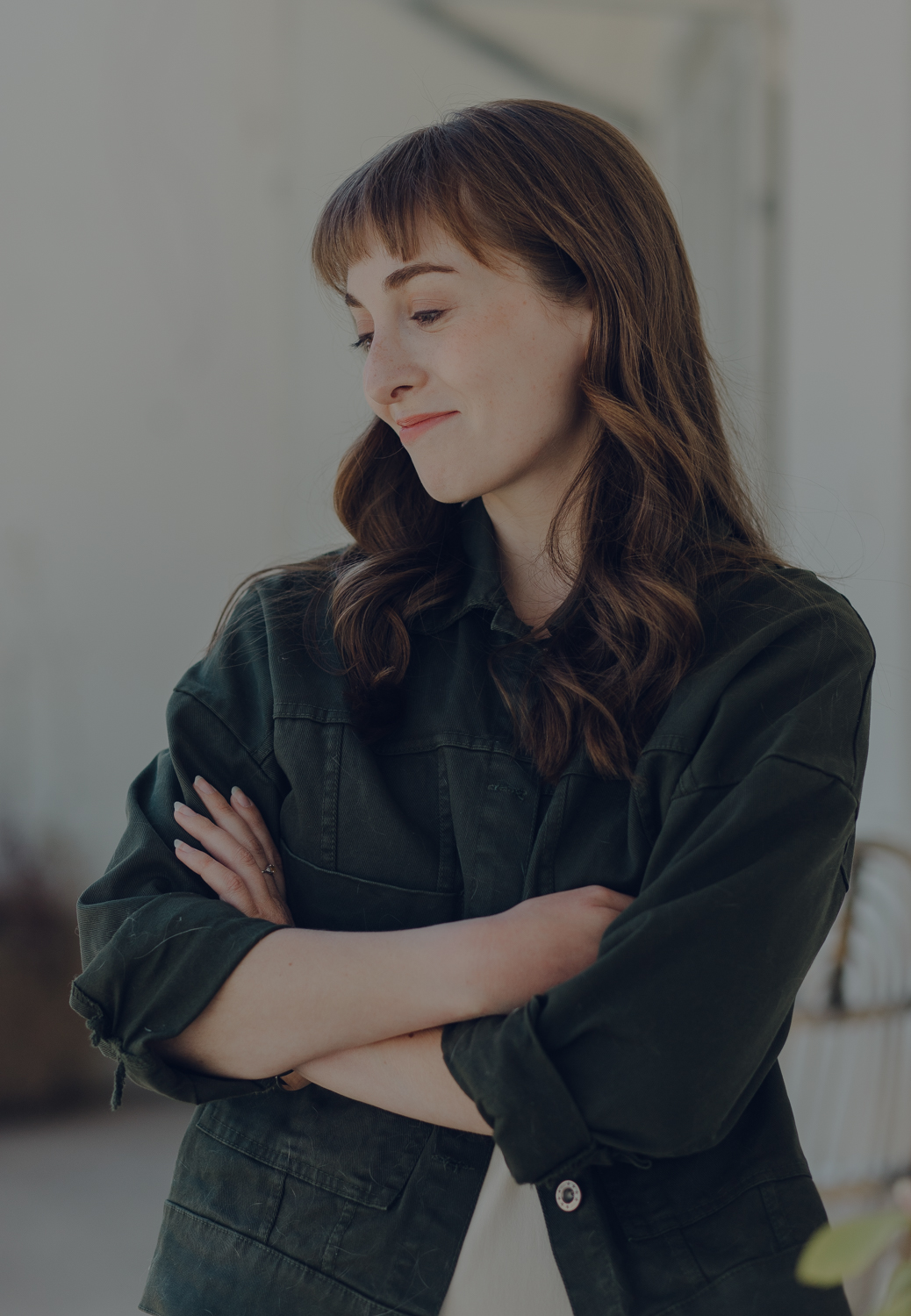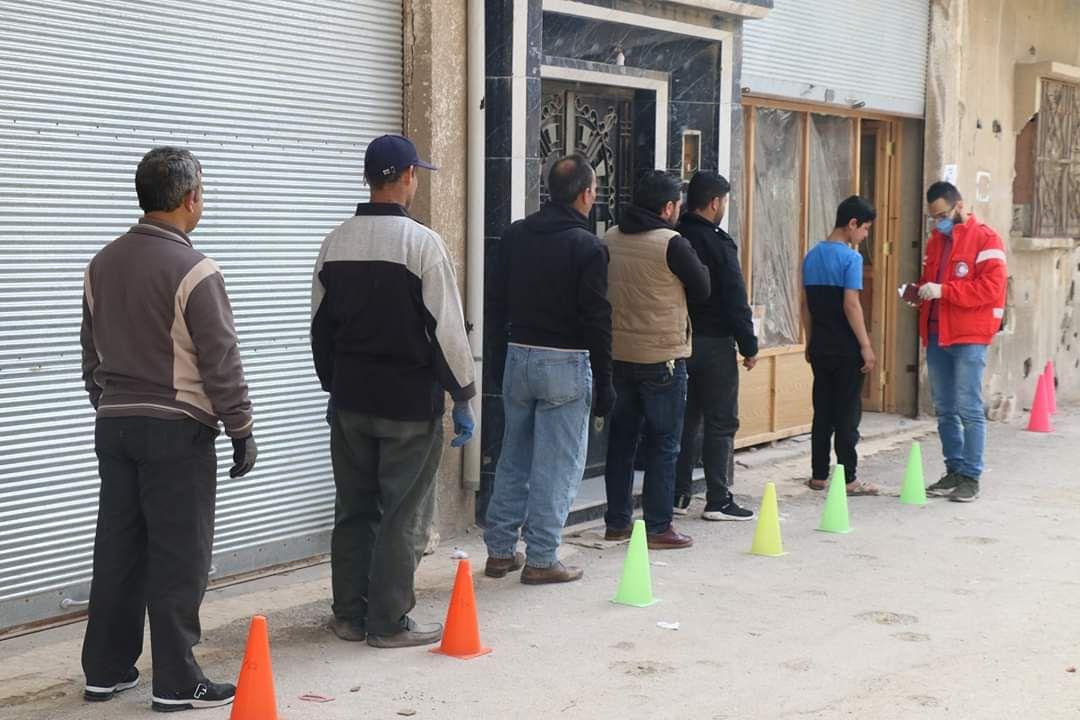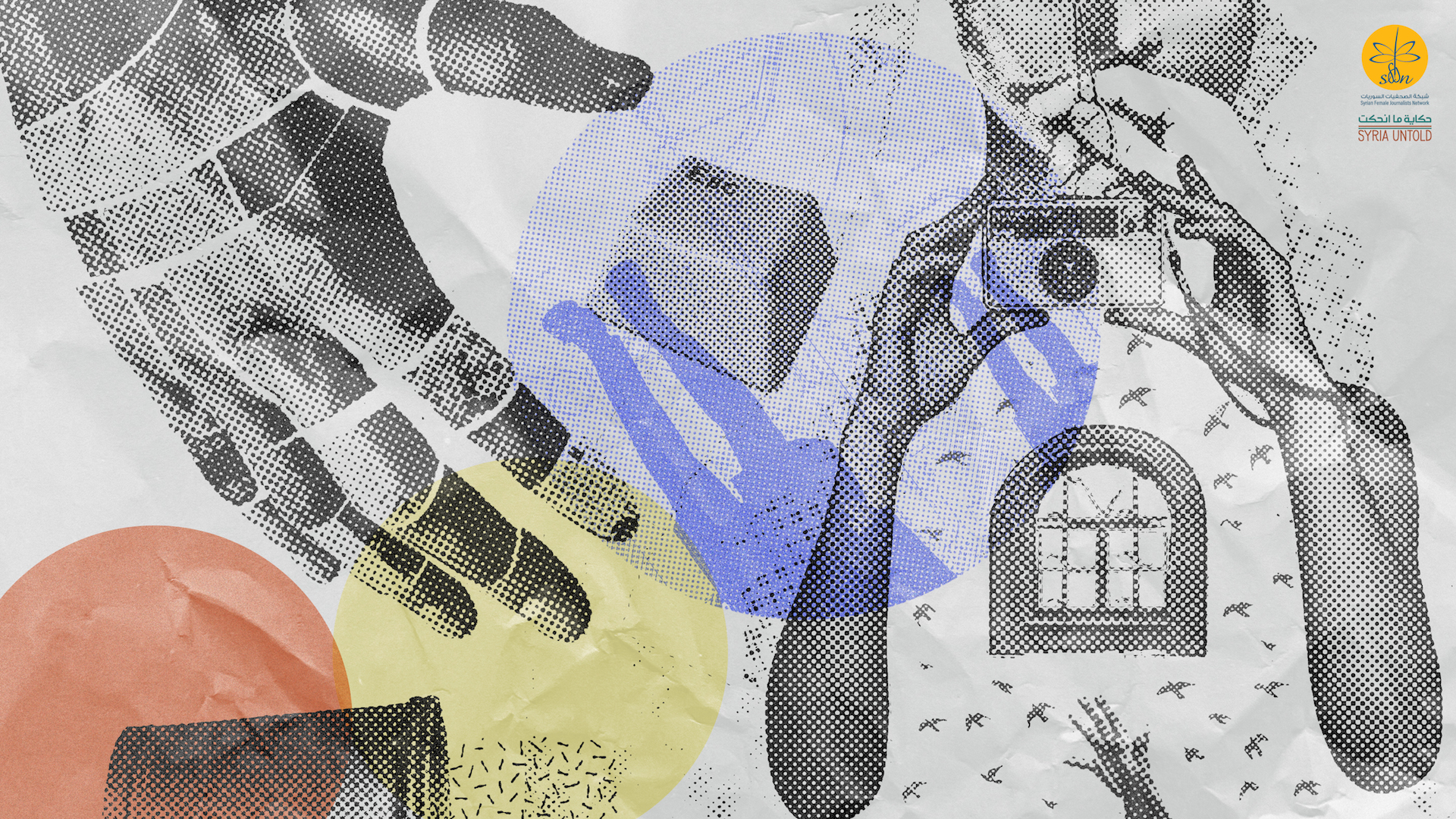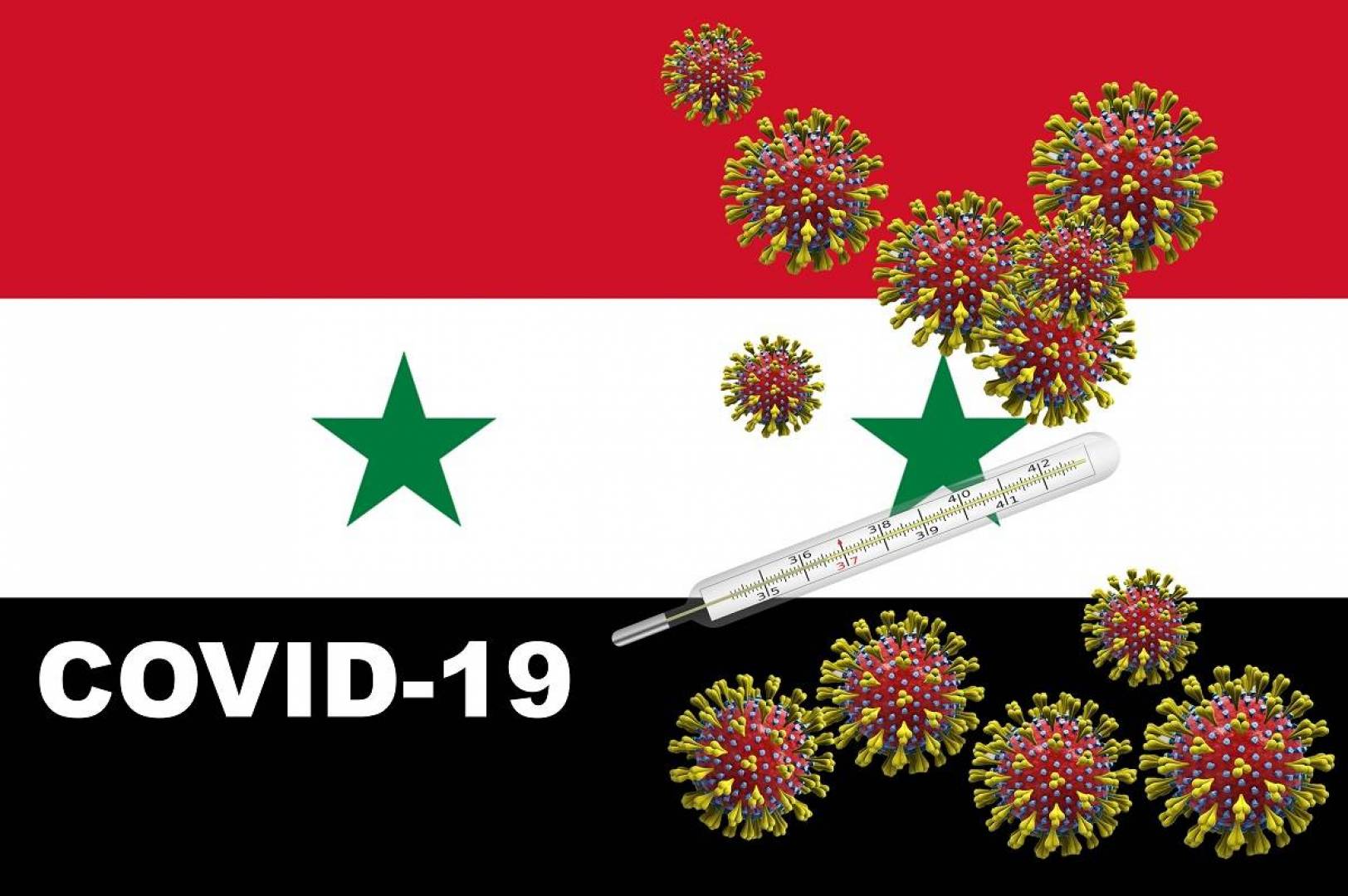Cemeteries working double shifts, an explosion of online condolences, family visits devoid of the usual extended hugs and kisses.
The Syrian government’s official numbers do little to illustrate the scope of the COVID-19 crisis, now seemingly centered in Damascus. According to the Ministry of Health, some 2,830 people have been confirmed infected by the virus. The real numbers are likely in the tens of thousands, according to an investigation last month by Syria in Context, a weekly newsletter. Satellite imagery showed one cemetery outside Damascus growing in recent weeks as COVID-19 dead were quietly buried, the newsletter reported.
Medical care is lacking as well, with hospital beds in the capital city full, and testing centers shown crowded with people in recent photos published on social media. The crisis comes amid an already desperate economic situation, after months of inflation saw the Syrian lira flounder.
The drama queen of quarantine
23 June 2020
“Syrians are depending on themselves,” says Nour, a researcher living in a Damascus suburb. Nour requested a pseudonym for personal safety.
Filling the void, Nour says, are grassroots groups working to disinfect public spaces, distribute masks and source oxygen tanks for Damascenes who suspect they are sick with the virus, yet can’t make it to a hospital.
Still, any reliable information on just how deeply the virus has spread is elusive, as the government continues to publish figures far lower than the likely number of cases.
“We imagine that we might now be passing through what Italy went through [earlier this year],” says Nour. “But we are not sure. We can’t know."
Could you give me a general sense of what it’s been like inside Damascus these past couple months? How is the virus impacting your work, how you move around town, how you interact with your friends and family?
We are interacting either way, since the general curfew and lockdowns loosened up. It was removed, so since that, we have normalized. Nothing has changed, people have gone back to their lives, they’re going out. Around Eid al-Adha [at the end of July], movement was slowed down a lot, and you sensed that things were calmer in the city. People were using restaurants less. That was partly because of the economic situation, and also because of corona. But movement now is normal. You can go out freely, and people are meeting.
Most people in Damascus and the suburbs think that they have gotten corona [at some point]. They can say they recall an incident in which they thought they had corona in the last two or three months.
For example, my case. Two months ago, I had a bowel infection. I met two doctors, and told them I suspected it was corona because I read something on the World Health Organization website that said diarrhea was a symptom. But they did some tests and checked me, and just asked me to commit to a diet and take the medicines they prescribed. Three weeks later, I read a lot about how the virus in Syria is being witnessed as a wave of bowel infections. Others, friends of mine, said they lost their senses of smell and taste, some felt weak for a few days, or had something like the flu for a week or so. But they didn’t even consider at the time that it might have been corona, because that was before the [current] wave.
There is a kind of unique Syrian way of dealing with things, a kind of quiet[ness]. You know a naaweh? It’s the paper where you write the name of a deceased person and their relatives, and you announce when the death occurred and when there will be condolences. People are publishing these online, and you know from friends that there are some extreme cases.
People are mostly posting these naawat through Facebook stories. These are Facebook acquaintances, people I know in real life, or people I work with. Some of them are relatives of my friends. For example, my friend posted her father’s naaweh today. Yesterday someone posted about his aunt. Every day you have someone post for relatives. When I and others are having certain networks and seeing a certain number of naawat per day...that for us was an indication that we were going through the peak.
My family members live next to a cemetery, and see that the cemetery is opening days and nights. This is new, that the cemetery opens at night. And nobody is doing the prayers for the deceased people. So we know that there are [high] numbers of deaths. I heard from my family that the number of funerals in the cemetery next to them is around 10 per day—that’s in just one cemetery in Damascus.
And you can see in comments on Facebook how people are seeking a place in hospitals, and asking if anyone knows someone who can help with that. We’ve known since a month or two ago that the public and private hospitals are no longer accepting patients because they don’t have beds, and that you need wasta [personal connections] to get accepted.
Some volunteer groups have emerged. There is a prominent one called Akmha, which means “sanitize it.” They started in around March or April to sanitize public facilities for free. It’s a group of doctors and students. Then they shifted to providing oxygen cylinders when the need for that emerged. They estimated that people have requested 200 to 250 oxygen cylinders from them per day, which are going to people’s houses.
Most of the healthcare now is at home. People fear going to hospitals because they think it might bring them more virus contamination. And actually, you might not find [a bed]. I heard about people who went to another governorate for hospitalization. Most people actually just focus on domestic healthcare, unless they need ventilators.
For some reason though, people are more normalized now, as many have already caught the virus. They get back to their [normal] activities. I can say that things in Syria happen in strange ways, very slow, very calm, very quiet. You sense there’s something happening, and you get used to it very soon. And you just continue with your life. We were just discussing this yesterday. Three of us friends are seeing at least three or four naawat in our Facebook timelines per day. And the three of us all think we had the virus at one point. We shared our symptoms and stories.
Do you feel there is clear, publicly available information on how to get tested for the virus, or what to do if you suspect you have been infected?
The [testing] centers are known, and there were some scandals, pictures [published on social media], about the PCR tests because they were so crowded. Many people reported that their results have been delayed, which made them lose their plane tickets or travel reservations.
Have any of your close friends or family members tried getting a test?
No, not yet. Somebody I know had been working with the police who guard a test center, and he told me stories about the corruption, how people ask them if they can be intermediaries with the doctors, if they can change the results, about the delays in giving results.
Can people in your community afford safety precautions such as masks and gloves? Are they able to socially distance?
People are using masks now more than they were at the beginning of the virus—myself included.
I find that confusing, actually, because I was following SARC at the beginning of the lockdowns, when they were preparing a quarantine center. They were following the instructions of the World Health Organization, which say that people should maintain social distancing, and to wear a mask if you are dealing with sick people or if you yourself are sick. There weren't any cases at that time, so people just kept the social distancing. But after a while, you suspect that everyone around you might have the virus, so people just started using the masks mostly, more than the gloves. I know a couple volunteer groups who started to distribute masks at certain places, at bakeries, at the places where you buy the subsidized sugar, rice and soap, because usually those are crowded.
And the markets are still crowded most of the time. I can’t keep one meter of distance [between myself and others] when I go outside in my neighborhood. And people are still going out to pubs and clubs and bars, and that includes being close to other people and dancing. They justify it to themselves, especially recently. Most people say “okay, I think I [already] got the virus, and now I’m not afraid anymore.”
How else are you seeing people in your community changing their social lives (or not changing them at all)?
The lockdown affected social life a lot. People weren’t visiting each other. But many didn’t commit at the beginning. And when the lockdown was removed we just went back to our previous lives. I’ve been suffering—I don’t like kissing and hugging, but people are now back to shaming you when you refuse to hug or kiss. Sometimes they force you into it.
Except for certain cases. I still have some friends who refuse to be in close contact. Then when the real wave kicked off, there was slower movement that came during Eid. Many people didn’t celebrate Eid the same way they used to. That was partly related to health conditions, or fear, or the economic situation in general.
The main change is in condolences. People don’t visit. [In normal times], people do condolence sittings, and you go for three days and see the family [of the deceased]. We don’t do that anymore, the azaa.
And even in the naaweh, usually people say they’ll hold the azaa some place or another. Now, they say they’ll accept condolences by phone or social media chats.
I know a religious sheikh; he’s usually the one who does the prayers [over the deceased person]. But the Awqaf Ministry sent them [instructions] saying they should not accept any prayers in the mosques. There aren’t many people who come to the various ceremonies, and they do very simple prayers now in their cars outside where the deceased person lived. So religious ceremonies are changing.
At the beginning of the closure, the prayers were stopped like any other public activity. That actually caused some frustrations. People were protesting this on social media. They restarted after they left the closure to hold prayers. One of the indications that we were in the peak was about a month ago, when there was an announcement from the Awqaf Ministry to stop prayers. The prayers stopped for two weeks.
But mainly we stopped kissing and hugging, and we reduced visiting those who have elderly people living with them. But most social habits are still the same. We still visit homes and keep in touch.
I’m [going out] from time to time, and I’m justifying it as necessary, and mostly at outdoor places. But yeah, I’m one of those. This is the norm here. I can’t keep quarantining by myself.
Do you mind talking more about the corona-related volunteer work you’ve been tracking in recent months?
The Akmha group proved to be pretty prominent in organizing things needed for this stage—oxygen, home visits.
Where do they obtain oxygen tanks?
From private companies, from dealers. [Coronavirus] has generated a black market. The price of one cylinder has increased by three times since four weeks ago. And there was a fire recently at one of the factories where they refill the cylinders. Some of the volunteer group members travel to Hama and other governorates because there is an iron factory in Hama which has oxygen that is typically used in iron manufacturing. But now it can be used for medical purposes. They are also getting cylinders from other governorates [and bringing them here] because the spread [of the virus] seems to be more in Damascus and the suburbs right now.
Have you seen any meaningful coronavirus assistance in Damascus from the UN or other international organizations?
I know they have been doing some work. But I think these big NGOs are slower than what is needed. I know SARC has been receiving certain aid from several INGOs in response to coronavirus. I know that the World Health Organization is supporting the Ministry of Health directly, and the PCR tests come from them. But you don’t feel the presence of [international organizations] in everyday life.
You can say that Syrians are depending on themselves. They either buy [healthcare supplies], rent, or use some help—either from their [social] circles or from volunteer groups. Akmha is the biggest one in Damascus and the suburbs, and is spreading—now there is Akmha Hama and Akmha Lattakia. It proved to be useful. They started with maybe five [oxygen] cylinders and now they have more than 400 or 500. So they are responding to the need and getting bigger on a daily basis, and receiving a lot of donations.
The official government statistics haven’t been sharing the entire picture, as far as the number of coronavirus cases. Where are people in your community getting information on coronavirus to stay updated and safe?
Yesterday we were just assuming that we are blind on this level. You can sense that many people are dying or getting infected around you. But at the same time, you don’t have the whole picture, you don’t know about other circles of people and how many of them are infected. We imagine that we might now be passing through what Italy went through [earlier this year], but we are not sure. We can’t know.
One Akmha doctor was assuming that the number of new cases was between 2,000 and 2,500 daily in Damascus and the suburbs, according to the metric of how many oxygen cylinders are requested daily. I know from contacts in the Health Ministry that, even for the ministry, it’s hard to keep up because nobody is seeking hospitalization unless they are in a very serious condition. So they don’t know about the domestic cases and they can’t follow up.
Do you sense that there is any sort of fear surrounding speaking out publicly about how the government has handled the coronavirus crisis in Syria, or about how many cases of infection there actually are?
I don’t see a lot of fear. People are actually making memes about how the Health Ministry is sticking to a specific number daily, when the truth is something else. So people are joking about that. They sometimes hold the ministry accountable, because recently we saw the ministry announce a rise in the number of cases.
I was surprised at [the Akma] doctor's metrics. He’s someone who is building on information that they have. I felt that, okay, now you are challenging the state’s statements, but nobody cares anymore.
What about any sense of fear for volunteers participating in groups like Akmha?
Since the beginning of corona—we are talking about the month of March—there was some loosening up by the government’s side, to a degree. For example, many groups started to respond to the economic needs that resulted from the lockdown. It was considerably a free or different time to be working because people didn’t feel that they feared the government, like they usually [did]. It felt like everyone was in the same boat.
I wanted to tell you about the Akmha group for example. Before I met them, I was curious how they were providing the services they do so openly. They are actually using the Association of Deaf and Mute People. When they received a donation [to Akmha], the receipt had the name of that association on it. So they are acting in the name of an existing group. You can say they have some access, but still have to abide by some [of the government’s] rules.
Besides that, some of the members were guests on TV and radio programs. I remember in one of the TV interviews, the anchor was actually cutting off the person from Akmha when he was talking about how they respond to patients. But she did want to hear details about how, through this Facebook group, people are communicating and helping each other, and what is motivating the youth to get involved in their communities.
This falls into the strategy of the Syrian government: wishing people to act for them, and taking the credit.







